Text
I forgot how lonely it is to write original fiction.
Where are the kudos? The subscriptions? The comments? The people cheerleading me chapter to chapter? Where are the kind words and compliments and reassurances that what I'm writing isn't complete crap? Where are the unhinged emojis? The asks on Tumblr? Where are my mutuals in my dms apologizing for not reading the latest chapter right away (side note, you know you don't have to apologize at all, right??). Where is the fanart? Where are the recs?
Where is my motivation to keep going?
It's something I've been thinking about a lot, actually, lately. How the experience of writing fanfic is so unique. How you already have an audience, willing and waiting and captive. And that's really it, isn't it? You have an audience. It's almost performative, writing fanfic. It's being on a stage, a one-person show (or two, if you do it with a friend); it's getting live reactions to your performance, it's feeding off the energy of the crowd and informing it back in a feedback loop; it's improvised, sometimes, in almost-real-time. It's building something that you couldn't have built by yourself. A thing that takes on a life of its own.
It's an experience you can't get writing original fiction, and, honestly, not having it is making it hard to write something original at all.
8K notes
·
View notes
Text
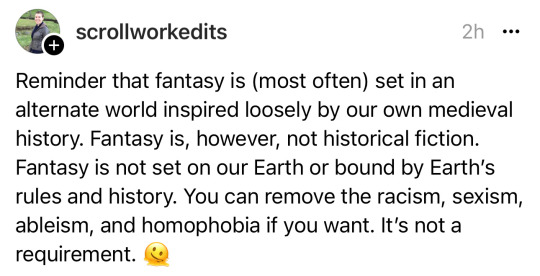
Reminder that fantasy is (most often) set in an alternate world inspired loosely by our own medieval history. Fantasy is, however, not historical fiction. Fantasy is not set on our Earth or bound by Earth’s rules and history. You can remove the racism, sexism, ableism, and homophobia if you want. It’s not a requirement. 🫠 (x)
#fiction#fiction writing#writeblr#writing tips#writing advice#fantasy writing#kcawf original#image description in alt text
665 notes
·
View notes
Text
There is no such thing as a perfect first draft. There are only great revisions.
Don’t get caught up with trying to make your first draft everything you want it to be. Instead, focus on the fundamentals, and then have fun sculpting it into what you imagine.
#fiction#fiction writing#writeblr#writing tips#writing advice#writing motivation#first drafts#reblogged#queue do count
348 notes
·
View notes
Text
A Bit of Caution
When publishing, money should go to you. If someone claiming to be an agent or publisher wants money from you, think 'scam' and run like mad. You may not be able to find an agent. You can self-publish in e-format for free on Smashwords.com (now Direct to Digital) and Amazon. In addition, the latter provides print-on-demand. There are also other platforms out there on which you can publish at no cost to yourself. You would be well advised to avoid anyone who comes looking for money from you.
252 notes
·
View notes
Text
Describing Foods - A Masterlist
As a broke university student, I love reading about food. It’s almost like eating a real meal myself <3.
I get a little angry when characters are eating a meal and I barely get to experience it with them. In that, I mean I don’t just want to know what it is, but what it’s like to eat that food—how it tastes, smells, sounds, and feels. Is a perfect croissant still a perfect croissant without the crack of the exterior, the airiness of the pastry inside, the smell of yeast?
Probably not. When writing about a dish, the smell, texture, technique, taste, and how it looks are all important to painting the experience, so here’s some words to use when describing a meal:
Taste:
Acidic: Sharp tasting. Often used to describe tart or sour foods as well.
Aftertaste: A different taste that remains in the mouth after eating something
Bitter: Tart, sharp, and sometimes harsh flavour.
Bittersweet: Less harsh than bitterness. Tartness + sweetness.
Bland: Has no significant flavor or texture
Briny: Just means salty. Often describes pickled foods.
Citrusy: Bright flavour like… well citrus fruits—oranges, lemons, limes, etc.
Cooling: Mimics that cooling feel—like mint.
Earthy: Reminiscent of soil. Can be used to describe wines, root vegetables, and mushrooms.
Fiery: Another word for spicy.
Fresh: Light and crisp—describes produce or herbs.
Fruity: Sweet and reminiscent of fruit.
Full-bodied: Rich and ‘feels heavy’ in your mouth. Can describe wines or soups.
Herbal: Bright, fresh, sometimes earthy from the presence of herbs
Honeyed: Sweet or candied taste like honey.
Nutty: Taste similar to the flavors of nuts. Often used to describe certain cheeses.
Rich: Full, heavy flavour. Often dishes that contain cream taste rich.
Robust: Rich + Earthy. Used for lots of wines or aged liquor.
Savory: Describes meaty, earthy dishes and soups.
Sharp: Harsh, bitter, or tart taste. Used to describe acidic foods.
Smoky: Reminiscent of the smell of smoke.
Sour: Biting, tangy, tart flavor.
Spicy: Burning taste.
Sweet: Sugary.
Tangy: Tart, biting taste—feels tingly
Tart: Sharp, bitter, or sour flavour. Used to describe acidic foods.
Woody: Earthy, sometimes nutty taste. Describes some coffees or cheeses.
Yeasty: Earthy taste reminiscent of yeast. Describes beer and bread.
Zesty: Fresh, vivid, or invigorating flavour.
Sound/Texture:
Sound has a lot to do with texture, so I've combined them for this section!
Airy: Light, pillowy texture (think inside of croissant)
Brittle: Hard but easy to break
Bubbly: Usually during heating, when bubbles rise to the surface—low sound.
Buttery: Smooth, creamy texture (think certain pasta sauces)
Chewy: Food that needs to be chewed thoroughly. Can be light and bouncy (chewy bread) or heavy (steak) and sticky (candy)
Creamy: A smooth and rich texture, comes from dairy.
Crispy: Light texture with slight crunch.
Crumbly: Food with loose structure that falls apart into crumbs.
Crunchy: Firm, crisp texture with a sharp, loud noise.
Crusty (behave): Food with a hard outer layer and soft interior (many loaves and breads)
Delicate: Light and fine, feels like it can come apart easily.
Doughy: Soft and heavy, usually pale colouring.
Fizzy: Usually liquids—a hissing sound, feels like ‘static’
Flaky: Light, characterized by layers that come apart during eating.
Fluffy: light and airy.
Frothy/Foamy: Airy bubbles, usually in a drink like a latte.
Gamey: Usually refers to meats when they’re very “meaty”
Gooey: Viscous, sometimes sticky texture from moisture in a dense/solid food.
Hearty: Firm, robust texture.
Juicy: Tender and succulent texture from liquid in a solid food (steak)
Molten: Hot, gooey
Oily: Slick, heavy, lingers on the tongue.
Silky: Fine, smooth texture that feels sleek.
Smooth: Texture free of grit, lumps, or edges.
Snap: A quick, sharp, crackling sound when broken.
Squelch: A soft sucking sound when pressure is applied. Somewhat gross.
Sticky: Gluiness in the mouth.
Succulent: Tender and juicy
Tender: Soft and easy to break down
Velvety: Smooth and rich
Smell:
Acrid: Strong, bitter, unpleasant
Comforting: pleasant, probably calls back to a nice memory
Damp: Wet smelling—probably a bit earthy
Delicate: subtle, faint, not overpowering
Earthy: reminiscent of soil
Fetid: Caused by decay—unpleasant
Fishy: reminiscent of fish
Floral/flowery: Reminiscent of flowers
Fragrant: Sweet or pleasing
Fresh: Cool, crisp, refreshing—produce, probably not cooked
Funky: Something’s gone off
Heady: Strong smell, pungent, rich
Musty: Not fresh
Perfumed: Pleasant, reminiscent of something (can be perfumed with citrus, say)
Piquant: stinging, pungent—tickles the nose
Powerful: strong
Rancid: Definitely gone off, decomposing
Ripe: Strong, usually unpleasant smell
Savory: spicy, salty, no elements of sweetness
Sour: has gone off
Spicy: Sharp, tingles the nose
Tangy: Strong and bitter but in a good way
Tart: Sharp
Woody: earthy smell, reminiscent of wood
Sight:
Usually texture gives us a really good picture of what a food looks like, so here’s some non-texture sight additions:
Blistered: Bumpy exterior.
Caramelized: Usually golden brown
Cloudy: Splotched. Almost see through if not for a slight white or grey mist.
Colourful: Bright and vibrant
Glassy: Resembling glass
Glossy: Smooth, shiny
Marbled: Two colours intertwined
Opaque: Not transparent. Can’t see through.
Ripe: Colourful (can be to a fault). Nearing the end of its edible state.
Scaly: Covered in scales, fish.
Shiny: Appears wet or glossy
Sparkling: Glimmers under the light
Stuffed: An ingredient placed inside a larger part with no additional space.
Translucent: Allows light through
Vibrant: Striking, bright
Food Prep:
How the food is prepared gives it these other attributes. If your character is familiar with cooking (or is the cook themselves!) they may describe food this way.
Baked: Cooked in an oven. Results in browned or crispy outer layer.
Blackened: When food is dipped in butter and coated with spices then cooked in a hot pan—spices darken, making it appear ‘blackened’
Blanched: Food scalded in boiling water and moved to cold water so it stops cooking. Texture comes out soft.
Braised: Food that is briefly fried in fat and then stewed in a pot. Results in seared, crispy exterior with a tender interior.
Breaded: Coated with breadcrumbs/batter then baked or fried so it turns crispy
Broiled: Food cooked with intense radiant heat in an oven or on the grill. Results in a darkened appearance and crispy texture.
Caramelized: Food slow-cooked until it’s browned, nutty, and has a bit of sweetness.
Charred: Grilled, roasted, or broiled and gains a blackened exterior and smoky flavor.
Fermented: Food that’s sat with bacteria, yeast, or another microorganism and has produced acids, alcohols, or gases. Results in a biting, pungent flavor. (Kimchi is fermented)
Fried: Food cooked by submerging in hot oil. Creates crispy, crunchy texture and golden colour.
Glazed: Food with a coating brushed onto its surface. Appears glossy with a thin, flavorful, and crisp outer layer.
Infused: Food steeped in liquid with another ingredient so it carries the essence of that ingredient. Used with herbs usually.
Marinated: Usually meat soaked in liquid containing flavourful herbs, spices, vinegar, or oil.
Poached: Food cooked in near boiling water. Results in tender, moist texture.
Roasted: Food cooked with dry heat in an oven or over the fire. Results in browned exterior and crisp coating.
Sautéed: Food cooked quickly in small amount of fat.
Seared: Food cooked in small amount of fat until caramelized. Finished by roasting or grilling. Results in crisp exterior and tender interior.
Smoked: Food exposed to smoke from smoldering wood for a long time. Results in that distinctive smoky flavor.
Whipped: Food beaten to incorporate air. Light and fluffy.
What did I miss?
#fiction#fiction writing#writeblr#writing tips#writing advice#description#narration#reblogged#queue do count
1K notes
·
View notes
Text
7 Ways to Hook Your Readers
How do you start a story? Why, you start it with a hook! A hook is something that intrigues the reader and has them enthralled. Sometimes, the first sentence is the hardest one to form, so here, I'll give you some examples on how to hook your audience into your story!
>>> A question: This is a pretty well-known tactic: starting off with a question for your reader has them thinking how they'd answer; hence, pulling them further into your work. If you want, your character can answer the question too! However, the question must be relevant to your story.
>>> A idiom/quote/saying: Sayings are commonly used, though one can find them controversial at times. Regardless, the majority of people understand what the meaning behind them are; and because of that factor, along with its popular usage, proverbs quickly attract readers' attention while giving some insight to your character.
>>> One-word starter: This one is pretty simple, and if you really don't have any ideas, maybe give this one a shot! The hook is simply one word (or even a short phrase) that portrays a strong part of your character. Its out-of-context and vagueness trigger interest in your reader.
>>> Starting action: Like the one-word starter, this hook seems contextless, but it's a quick way to captivate your reader and have the suspense emerge! Example: "Blood covered the ground like a thin blanket, staining the once-clean quartz with a shade of scarlet. A pair of depthless eyes seemed to burn a hole into the last person in the room; a messy, pitiful, scrambling figure."
>>> Dialogue: By now, it should be obvious that your hook should be enthralling and evoke interest in your reader. Opening with compelling dialogue can help introduce the plot and characters of your story!
>>> Interesting Introduction: Is there something special about your character? Introductions can be difficult to sneak in, but not when it's a hook! Make a short description consisting of several defining traits of your character, and be sure to add the special thing about your character as a twist to snag your reader's attention! Additionally, you can be creative with this! An introduction doesn't have to come from your main character, it can come from another character describing the protagonist!
>>> Setting: Does the setting have a strong influence on the story? Even if it doesn't, beginning with a descriptive setting can slowly captivate your audience!
Alright! These are seven ways to hook your reader: a question, a saying, one-word, action, dialogue, an introduction, and a setting! Of course, there are many more ways, so explore around!
Happy writing~
3hks :)
1K notes
·
View notes
Text
Lessons for the overplanner
Writing is a different experience for everyone, but here are some important lessons that took me a little too long to learn.
Lesson One
Don't over plan! Go in knowing these three things:
start point of the protagonist
end point of the protagonist
motivation of the protagonist.
Everything else you can make up as you go along.
That way, the things that happen in the story will be there because you need them to be there and you're less likely to end up with a bunch of fully fleshed minor characters that have no purpose except to overburden you and your reader.
Lesson Two
When you write the first draft, don't waste time on things like finding the perfect place name, character name, character dialect and other worldbuilding details. In the first draft they don't even need to be consistent. These things are easy to change at any point, and more so in the second draft, when you know what is relevant and fitting to the story and what is not.
Lesson Three
If you feel like you are getting stuck, and you're not sure what should happen directly up ahead, keep writing for a bit longer. Sometimes it will become clear to you what should happen in a scene only after you've written the scene.
Failing that, write a scene later in the story where you do know what happens. This will often give you a clue as to what needs to happen earlier.
-
Writing is like sculpting. You don't know what you're making until you discover it on the page.
#fiction#fiction writing#writeblr#writing tips#writing advice#writing motivation#reblogged#queue do count
59 notes
·
View notes
Text
Fantasy Guide to Building A Culture

Culture is defined by a collection of morals, ethics, traditions, customs and behaviours shared by a group of people.
Hierarchy and Social Structures

Within every culture, there is a hierarchy. Hierarchies are an important part of any culture, usually do ingrained that one within the culture wouldn't even question it. Hierarchy can be established either by age, gender or wealth and could even determine roles within their society. Sometimes hierarchy can may be oppressive and rigid whilst other times, ranks can intermingle without trouble. You should consider how these different ranks interact with one another and whether there are any special gestures or acts of deference one must pay to those higher than them. For example, the Khasi people of Meghalaya (Northern India), are strictly matriarchal. Women run the households, inheritance runs through the female line, and the men of the culture typically defer to their mothers and wives. Here are a few questions to consider:
How is a leader determined within the culture as a whole and the family unit?
Is the culture matriarchal? Patriarchal? Or does gender even matter?
How would one recognise the different ranks?
How would one act around somebody higher ranking? How would somebody he expected to act around somebody lower ranking?
Can one move socially? If not, why? If so, how?
Traditions and Customs

Traditions are a staple in any culture. These can be gestures or living life a certain way or to the way a certain person should look. Traditions are a personal detail to culture, they are what make it important. Tradition can dictate how one should keep their home, run their family, take care of their appearance, act in public and even determine relationship. Tradition can also be a double edged sword. Traditions can also be restrictive and allow a culture to push away a former member if they do not adhere to them, eg Traditional expectations of chastity led to thousands of Irish women being imprisoned at the Magdelene Laundries. Customs could be anything from how one treats another, to how they greet someone.
How important is tradition?
What are some rituals your culture undertakes?
What are some traditional values in your world? Does it effect daily life?
Are there any traditions that determine one's status?
Values and Opinions
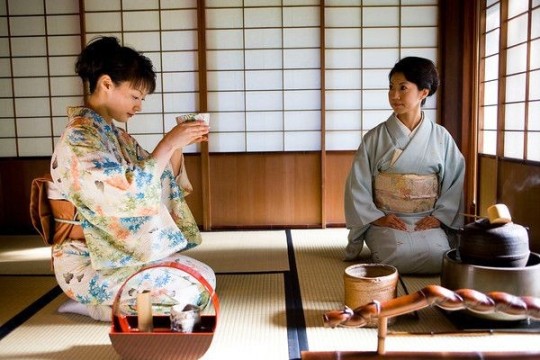
Values and Opinions are the bread and butter of any culture. This is the way your culture sees the world and how they approach different life hurdles. These may differ with other cultures and be considered odd to outsiders, what one culture may value another may not and what opinion another holds, one may not. There will be historical and traditional reasons to why these values and opinions are held. Cultures usually have a paragon to which they hold their members to, a list of characteristics that they expect one to if not adhere to then aspire to. The Yoruba people value honesty, hard work, courage and integrity. Here are some questions to consider?
How important are these ethics and core values? Could somebody be ostracised for not living up to them?
What are some morals that clash with other cultures?
What does your culture precieved to be right? Or wrong?
What are some opinions that are considered to be taboo in your culture? Why?
Dress Code

For many cultures, the way somebody dresses can be important. History and ethics can effect how one is meant to be dressed such as an expectation of chastity, can impose strict modesty. While other cultures, put more importance on details, the different sorts of clothes worn and when or what colour one might wear. The Palestinian people (من النهر إلى البحر ، قد يكونون أحرارا) denoted different family ties, marriage status and wealth by the embroidery and detailing on their thoub.
Are there traditional clothes for your world? Are they something somebody wears on a daily basis or just on occasion?
Are there any rules around what people can wear?
What would be considered formal dress? Casual dress?
What would happen if somebody wore the wrong clothes to an event?
Language

Language can also be ingrained as part of a Culture. It can be a specific way one speaks or a an entirely different language. For example, in the Southern States of America, one can engage in a sort of double talk, saying something that sounds sweet whilst delivering something pointed. Bless their heart. I have a post on creating your own language here.
Arts, Music and Craft

Many cultures are known for different styles of dance, their artwork and crafts. Art is a great part of culture, a way for people to express themselves and their culture in art form. Dance can be an integral part of culture, such as céilí dance in Ireland or the Polka in the Czech Republic. Handicrafts could also be important in culture, such as knitting in Scottish culture and Hebron glass in Palestine. Music is also close to culture, from traditional kinds of singing such as the White Voice in Ukraine and the playing of certain instruments such as the mvet.
Food and Diet

The way a culture prepares or intakes or treats certain foods are important to a culture. In some cultures, there is a diet yo adhere to, certain foods are completely banned. With Jewish culture, pork is prohibited along with fish such as sturgeon, along with shellfish and certain fowl. Meat must also be prepared in a certain way and animal byproducts such as dairy, must never be created or even eaten around this meat. This is known as kosher. The way one consumes food is also important to culture. In some cultures, only certain people may eat together. Some cultures place important on how food is eaten. In Nigerian culture, the oldest guests are served first usually the men before the women. In Japanese culture, one must say 'itadakimasu' (I recieve) before eating. Culture may also include fasting, periods of time one doesn't intake food for a specific reason.
What are some traditional dishes in your world?
What would be a basic diet for the common man?
What's considered a delicacy?
Is there a societal difference in diet? What are the factors that effect diet between classes?
Is there any influence from other cuisines? If not, why not? If so, to what extent?
What would a typical breakfast contain?
What meals are served during the day?
What's considered a comfort food or drink?
Are there any restrictions on who can eat what or when?
Are there any banned foods?
What stance does your world take on alcohol? Is it legal? Can anybody consume it?
Are there any dining customs? Are traditions?
Is there a difference in formal meals or casual meals? If so, what's involved?
Are there any gestures or actions unacceptable at the dinner table?
How are guests treated at meals? If they are given deference, how so?
#fiction#fiction writing#writeblr#writing tips#writing advice#fantasy writing#worldbuilding#fantasy culture#reblogged#queue do count
8K notes
·
View notes
Text
Pacing A Story: What’s The Rush?
Pacing a story appropriately will keep readers engaged. Unfortunately, many mistakenly think this means the story needs to be rushed.
I see a lot of trends in today’s literature. Perhaps the biggest one is that every writer seems to be in a rush. Many new writers try to keep the pacing blazing hot. They’ve heard that in today’s world, kids are trained to think in “sound bites,” and anything longer than a television commercial bores them.
As a result, writers try to keep their description stark, the narration nonexistent, and the action heavy. They write rapid-fire dialog.
Unfortunately, their stories become a blur. They never really come alive.

Rushing a Story vs. Pacing a Story
When I talk to the authors about this problem, they’ll always begin to explain by saying, “I was afraid that it would be too slow.” Stop being afraid.
Pacing is important, but it’s not all-important. I love an energetic story as much as anyone, but great writers manage to bring their worlds and characters to life without sacrificing the pacing of the plot.
“Rushing” a story isn’t the same as “pacing” it. Years ago, when people rode horses, they found that they could get the most out of an animal if they “paced” it. They’d walk the horse for a bit, speed it into a canter, then run it, then let it cool down by walking again. Then let it stop and graze and drink, then go through the whole process over and over again. That’s what the word “pacing” means. If you just leap on your mount and run it as fast and as long as you can, you know what happens? The horse dies.
Stories are much the same way. There are scenes that you want to race through, and others that require you to slow down. In fact, there are some scenes that may need to come to a dead stop.
here was a time, say a century ago, when people used to talk about sitting down to “enjoy” a novel, or “relax into” a novel. A story wasn’t necessarily seen as an adrenaline pump.
The Virtues of Slowing a Story

There are a lot of virtues that a slow story can have that a fast story doesn’t. For example, if I want a story to be intellectually complex or morally profound, I may need to spend more time narrating thoughts and internal dialog as my protagonists wrestle with major life-changing questions. Does this slow the story down so that it’s boring? No, it actually engages the reader intellectually, and may carry the reader better than another action scene would.
If your reader is a normal, thinking person, he or she will most likely find such passages to be delicious—the best part of the tale. If your reader is not a normal, thinking person—heck, people like that don’t read anyway. Let’s face it. They’re staring at the television with glassy eyes, or sitting out on street corners and watching others drive by.
Similarly, if you’re writing luscious prose—if your own unique poetic eye informs every description, every phrase—then that can be a huge draw for readers, too. It lets them see their own world in a new, and often exciting, way.
Slow Down and Engross the Reader
There is tremendous power in writing a story that engrosses the reader, a tale that engages the reader intellectually, emotionally, and artistically while at the same time transporting the reader into a fully realized world. If you’re not engrossing the reader, if you’re just racing through the story in an effort to keep them on an adrenaline high, then your tale is like an engine that’s only running on one cylinder. It may chug along, but it’s clunky and inelegant.
So authors who rush through a story, sacrificing clarity, profundity, and grace in an effort to draw readers run a huge risk. Too often their stories come off as feeling artless or vapid.
Slow down. Your job as an author is to pace your story, to make it delicious in a number of ways. If you feel that your description is weak, don’t cut it out or try to gloss over it. Instead, you have to learn to write gorgeous, powerful description.
That’s your job as a writer—to become multifaceted as an entertainer.
Read more at MyStoryDoctor.com
#fiction#fiction writing#writeblr#writing tips#writing advice#pacing#story pacing#reblogged#queue do count
22 notes
·
View notes
Text
Tips for writing black characters
Day-to-day practical and minor stuff, specially regarding hair
If you have curly/afro hair then you are only going to need to wash it one or twice a week
But it can take a while. When I had long hair it used to take me 2h in the bathroom to properly wash it. That's why I only did it once a week. But it really will depend of the thickness and lenght of their hair.
It can be a little harder to find products for their hair, because straight/wavy hair products don't work on ours
If you wash curly hair many times a week it will eventually lose its nutrients, differently from straigh hair
If your character originally had curly hair but straightened it, it's probably going to look a little drier than naturally straight hair. it's a case-case scenario, though
If they have a skin care routine or want one they'll also need products made specifically for black skin
Your character is not immune to sunburns. It's harder to see if it gets red depending on how dark their skin is, but it's there. The more melanin they have, the more protected from the sun they are, but it's not gonna 100% prevent them from getting sunburnt.
Oh, and it can be pretty hard to dye it because first, if your hair is very dark, you have to decolor it, and depending on how black it is it can take a while and a few tries to get in a tone good for dying.
If they have long hair they're probably going to take a while combing it because you have to apply the hair cream lock by lock
They may have a haircare routine every month or so. Not everybody does it but if your character is disciplined and wants their hair to be extra healthy and neat they'll probably have one
If they care a lot about their appearence they'll probably have a lot of hair brushes of different types because depending on your brush you can comb it in a variety of ways, making your hair look fuller, making the curls look defined, etc.
#fiction#fiction writing#writeblr#writing tips#writing advice#black characters#characters of colour#reblogged#queue do count
1K notes
·
View notes
Text
Some tips for Ace/Aro characters in fandom
I've been seeing this discourse again and I dunno I kinda wanna scream my opinions into the void as an older asexual who just tired of this.
There's this weird thought that if a character is Ace/Aro its like you can't ship the character or do sexy things with them and thats not really true, its entirely dependent on the character and you just need to offer them some more thought/care than you would an Allo character/relationship.
(Also you people saying you can't ship this cause one character is ace/aro and totally not cause it directly competes with your preferred ship I see you you ain't sneaky, trying to act holier than thou nonsense)
So you got an Ace/Aro cannon character and are wondering if it's ok to ship them, well here's a question has the character expressed a strong desire to NOT be in a relationship? If yes then yeah don't ship them. IF however their opinion has not been revealed or if they just seem passive then go right ahead you aren't going against the character and plenty of Ace/Aro people do want partnerships.
Now you might be thinking "Oh so I can just do what I normally do with my ships right?" Mhhmmmmm maybe there are aspects to Ace/Aro relationships that don't differ from Allo relationships but there are more that do. You need to really look at your character and how they approach things much more carefully than you would an Allo if you don't want to erase their Ace/Aro-ness. Example say the character is rather touch adverse you shouldn't then depict them clinging to another character instead show affection in tinier ways or show that they are doing this despite their discomfort for the other character.
Another thing to avoid is focusing too much on the relationship, if you go too hard on the not having an interest before this person it can come off like they "Fixed" their ace/aro-ness and kinda borderlines a fetishy area. Avoid statements like "I never felt this way until you" and go for something more casual like "It doesn't matter to me but you do"
And here's the part people really care about ughhhhh sex. Yes Ace/Aro people can have sex some even want sex so depicting an Ace/Aro character doing sexy things isn't necessarily erasure again so long as you depict it with CARE. Again if the character in question has directly stated they are sex repulsed for all that is holy do NOT have them have sex unless you put in a LOT of work into (aka not for those new to this) But if the character is more disinterested then you can have them do sexy things so long as it doesn't cause like a seismic shift in how they view sex, don't make it "Wow this is amazing I never knew" and lean more towards "It wasn't so bad with you" Again it all comes down to the character themselves so like pay attention.
Also try to avoid the who innocent bean thing like they aren't interested therefor they know NOTHING about sex, like yes it depends on the character but if you do this too much and too like cutesy it can come off like a virgin fetish or infantilizing.
Finally yes you can depict Ace/Aro characters in sexy ways (this is more for Ace characters but I wanna cover my bases with people) but again it depends on the character some aces like to look and feel sexy they just don't like sex and others don't want to be sexualized at all, for others its a case by case bases, again if it is something the character would do or hasn't said anything its fair game.
There's no way this covers everything really what important is just learning about Ace/Aro people and putting just a little more effort in when handling them. You can still have fun with them, still ship them, being Ace/Aro is not the death sentence some in fandom make it out to be, it can even lead to different and fun dynamics you hadn't considered or explored before.
#fiction#fiction writing#writeblr#writing tips#writing advice#aromantic characters#asexual characters#queer characters#reblogged#queue do count
30 notes
·
View notes
Text
Fantasy Guide to Education

I'm always asked what sort of education different people recieve throughout different historical eras and since I'm heading back to college soon, I thought it was high time I made this guide.
Disparity

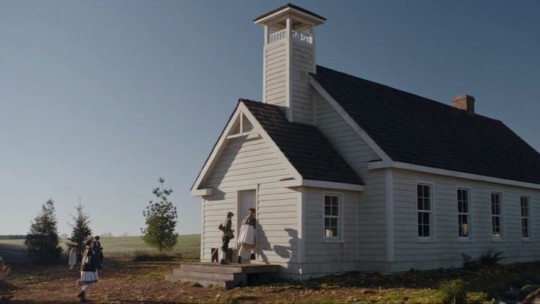
Education is viewed as a right by many but for some and thoughout history it was a privilege. For the wealthy and those of high status, education can be easily accessed. They can afford to tailor an education to fit their needs, they can hire tutors, and they can afford tuitions to top schools. For the poor, education was a luxury. However this doesn't mean that it was available. Some communities would fund a school or send their children to a local teacher - usually they had to pay a daily fee or at least bring kindling for the heating. Many poorer children also worked so they could not attend school consistently or were pulled out very early into their education. However, some poorer students could gain access to high level education if they were extremely bright or caught the attention of a wealthy benefactor who could fund their education.
Education as a Weapon

Education could also be banned for certain groups in society. It could be illegal to fund schools or host gatherings for students of a certain background, race, religion or gender. Education against the law could be punished by imprisonment, exile or execution. This is a measure usually taken by oppressive governments in order to follow a moral code or restrict the betterment of a certain group. An example would be the Irish Catholics under the Penal Laws.
On the otherhand, there is education that is influenced by the state to inject certain values, moralities and Opinions into a population. This is the intense restriction of reading material, removal of books that contest the teachings of the government or the kidnap of children from their culture, in order to forcibly educated them in alignment to their beliefs. An example would be the residental schools of North America and Canada and the AHS schools of Nazi Germany.
Content
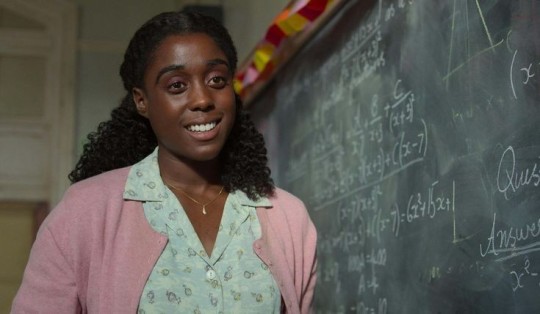
As above, content of what children learn usually falls into a certain category. This is also true for the education offered to the wealthy and the poor. The poor would be offered a basic education, learning literacy and arithmetic, usually with an expectation that the children would not go on to any jobs that needs a broader education. Any higher education would be hard to obtain because of cost and the discriminatory view of the enrollment panels. The wealthy would have access to an array of different subjects including: The arts (drawing, music, painting, poetry, dancing), sports (riding, martial skills, rowing, hunting), arithmetic, geography, languages, geography and history. While progression to higher education will still be difficult, any affluent families are legacies of prestigious colleges or can make a donation to grease a few palms. These schools would be where the wealthy make lifelong connections and get springboarded toward opportunities.
Private Tutoring
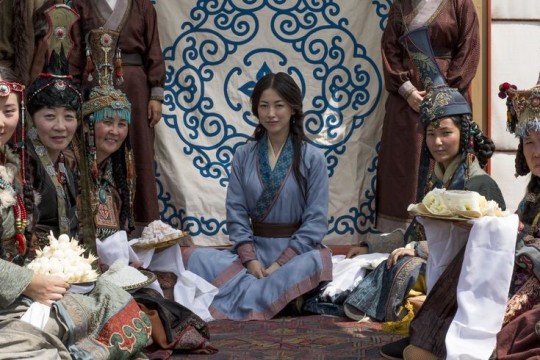
Whilst some affluent, aristocratic and Royal families send their children to schools, private tutoring in the home was a popular choice. Children would be educated at home but tutors who either lived in the home or come to the house. The children would be educated alongside siblings or the children of courtiers or neighbours. Private tutoring sessions would often be the only education for upper class women recieved, taught by governesses and tutors.
Premises and Equipment
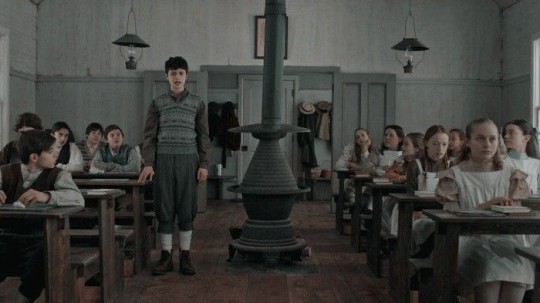
As mentioned above, wealthy and aristocratic families would usually attend established schools or attend school at home. They would be provided any equipment they needed. If they attend school, they would often wear a uniform. Some schools had multiple variations of the uniform for different activities. Many of the schools attended would be boarding schools. Boarding schools offered education to those who boarded and day students, however day students were often looked down upon as lesser than.
Poorer schools would be relient on donations and fees paid by students. As mentioned above, there may be a building reserved for classes - sometimes an designated schoolhouse or a teacher's home or a public building such as a gathering house or sometimes even outside - hedge schools. Equipment would be provided by the school. Uniforms at poorer schools were not a thing but students were expected to show up neat and tidy.
Corporal Punishment
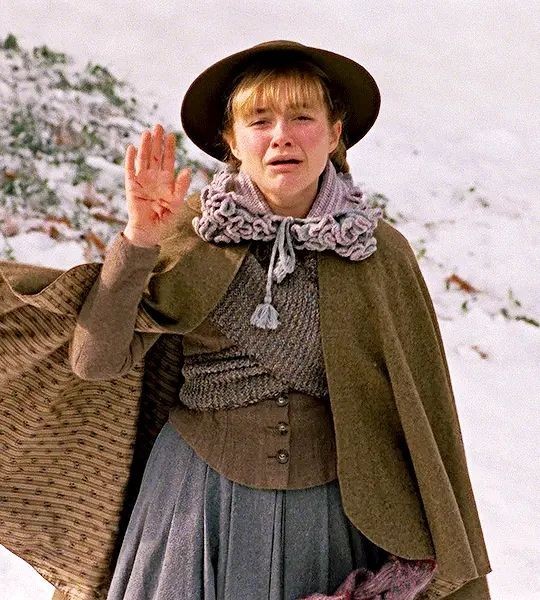
Corporal punishment at schools was the go to punishment for students. Teachers had free rein to strike children for mistakes and bad behaviour. Punishments include insolation, physical stress positions such as standing on a chair all day, getting objects thrown at them, being slapped on the back of the legs with a cane, being rapped on the palms or knuckles with a crop or ruler. Students may also be humiliated by teachers through the use of dunce hats, encouraging other children to bully them or by the use of verbal abuse. Corporal punishment did extend to all classes except for royal children since that was either taken by proxy by whipping boys or left up to parents.
#fiction#fiction writing#writeblr#writing tips#writing advice#fantasy writing#reblogged#queue do count
797 notes
·
View notes
Text
Plot Holes and How to Fill Them (Or, The Hidden Potential in Your Mistakes)
“But why didn’t they just do that earlier!”
“You can time travel – so time travel!”
“Doesn’t X have Y spell? Why aren’t they using it to escape?”
“You. Have. Telekinesis! How are you this stupid?”
Plot holes! The bane of every writer’s existence. You think you’ve polished your beautiful manuscript, you have it all sent out for the masses to consume and praise and shower with compliments and adoration… and then they start tugging at a thread that may or may not begin to unravel your entire story. You’ve read this thing top to bottom, forwards and backwards and upside down, so many times the letters are burned into your brain. You mumble your monologues in your sleep — how did you not see this? How do you fix this?
See this post about beginning the writing process that might help you avoid opening a plot hole entirely with a solid enough script and outline.
Types of Plot Holes
Your magic system’s established rules have just been broken for TeNSioN
Your Deus Ex Machina really did come out of nowhere and is quite out of character
Why doesn't Character just run away from a fight they can't win?
Characters forgetting they have superpowers, extreme intelligence, handy tools or weapons, survival skills, common sense, or crucial information to escape and/or solve a situation
Characters dying for the above mistakes when said death could have been avoided
The entire story could have been avoided had Character A just told Character B the truth
Character X should have known ___ all along given their profession/backstory/friend circle/education/personality
And variations of the above, I’m sure I’m missing a couple. Fixing plot holes generally come in two camps: Those you can fix by rewriting the existing manuscript that contains the hole, or those you have to work around from a previous manuscript that’s already been published.
Why Plot Holes Happen
Plot holes happen in reality. Expecting your first, second, or 15th draft to be completely foolproof is utter nonsense. Real people forget stuff they’re supposed to know all the time, tools that would be useful are left behind, GroupThink makes very bad decisions.
The difference is: You are writing fiction. Your goal is to be entertaining, not necessarily realistic. A character simply *forgetting* Macguffin X at the climax of the story does not make for an entertaining read, no matter how likely it might be to happen in the real world.
You’re making this entire world up as you go and that alone is an impressive feat millions of others can only dream about – cut yourself some slack, okay? Everything is fixable.
Plot holes also happen because we’re so engrossed in our own story that we forget it’s all made up. You’re 22 chapters into a 24 chapter novel and you’ve just realized your psychic hero would never have been caught unawares like this. “But that’s just how he is!”
No. Stop. That’s not just how he is. That’s just how you wrote him – and you can go back and un-write him. Any excuse you can dream up you can un-write, and unfortunately, you’ll likely have to do a fair bit of it if you still have the opportunity.
Plot holes generally open long after the inciting incident that causes them. If you’re going to fix it, duct-taping together a solution in that very same scene isn’t the way to do it. You have to figure out why it’s a hole at all, then go back and fix its foundations.
Finding Your Own Plot Holes
Sometimes you’re lucky enough to stumble upon them before it’s too late. A fair bit of the time, though, your audience has to tell you. Finding your own plot holes requires stepping back from your work and looking at it like you’re just a reader, not the author.
Read your plot out loud to yourself and keep asking questions like:
Does this make sense for the scene?
Does this only exist to look cool at the cost of logic?
Are these rules I wrote too easy to break or contradictory in any way?
Is there any other way for this character to escape this situation?
Is the only solution here too contrived?
That, and having an army of beta readers who should show you flaws you’ve overlooked. Even then, some things just aren’t obvious at all until someone too smart for their own good points out something no one else considered before.
It’s okay. It’s not the end of the world.
Filling Plot Holes
Fix your broken magic system
A “magic system” broadly describes any type of powers/abilities/supernatural entities that function in your world. They can be in high fantasy, urban fantasy, sci-fi, or any genre really. The Force is a magic system, as much as is bending in Last Airbender even if no one calls it “magic”.
For example: Force users are telekinetic… and yet don’t simply repeatedly spam the “chuck my enemies into a wall/off a cliff/anywhere that is away from me” button. It’s what you’d call a “soft” magic system, it doesn’t have explicit rules on how and when it can and should be used. It just *is*.
Fixing holes in your magic system first demands examining why you wrote it the way you did, why you gave it these specific rules, or why you didn’t, and all the ways characters should otherwise be able to use it when your story demands they get creative.
For soft magic systems — never let the magic system win the day. It invites far too much scrutiny. Gandalf from Lord of the Rings is a Wizard. He can do an undefined number of spells and has an unclear number of abilities and limit to his reach. Gandalf’s magic is never the saving grace of the Fellowship. So asking “why didn’t Gandalf just do X” isn’t ever a question people have because success never depends on Gandalf doing X.
Everyone hates on the time turner in Harry Potter, as they should. Time travel is essential to the plot of Prisoner of Azkaban, without it the heroes fail. And yet, because it is time travel, why it never existed earlier and why they never use it again to solve more massive plot problems is a valid question. As goes with many spells and abilities in the series.
For hard magic systems — remember that you wrote the rules, you can go back and change them at any time before it’s published. Bending in Last Airbender is rarely the focus of any conflict. Yes, two benders will fight each other, but it’s not “who’s the stronger bender,” it’s “who’s smarter with their element”. Who better uses their environment? Which one is racing against a clock before reinforcements arrive and overwhelm them? Which one runs the risk of exposing themselves if they start bending? Whose mental state is crippling their bending today?
These are all character-driven explanations for why certain abilities do or don’t manifest in a given scene… until the finale when it really is just a clash of red and blue aura lasers.
There is never a scene where a character is trapped when they shouldn’t be. Never a “why didn’t you just X” moment, because it’s never about the bending, it’s about the bender.
Turn plot-reasons into character-reasons
This means taking a “why don’t they just do X” and making the reason because one of the protagonists is morally against doing it, not because the hand of the author demands it.
In Last Airbender, Aang is vocally against simply killing the Fire Lord. It would be easier, it would risk far less casualties and carnage, it’s fastest. And yet. Aang doesn’t do it simply because he’s not strong enough or he doesn’t have some magical super weapon, or the stars have aligned and now he’s lost a very convenient ability – Aang doesn’t want to take the easy road because that’s who he is as a person.
He’s been raised as a monk to value the preservation of life above all else (ignoring any accidental casualties over the course of the series). Him being desperate to not simply kill Ozai is central to his character and even when he has the chance in the climax of the fight, he still doesn’t take it.
Now “why didn’t you do that earlier” does, still, concern the “energy bending” established out of nowhere just for the finale so Aang doesn’t have to compromise his morals to win… but the show is so damn good and Ozai’s just desserts so damn sweet it doesn’t really matter.
Making these plot decisions character decisions, so long as they are in-character, gives some juicy potential for schisms within Team Protagonist as fan favorites clash over ideals and morals and whether or not the greater good is worth them sacrificing something so central to their being.
This also applies to characters not sharing crucial information with each other. Make them distrustful of the others, or let them attempt it anyway and have some other consequence for the effort. Anything is better than a character sitting on valuable info simply to maintain the mystery.
Avoid Deus Ex Machinas
The “surprise reinforcement cavalry charge” is one of my favorite deus ex machinas in fantasy. Everybody cheers, it looks amazing, the music is swelling, our heroes on the battlefield realize they haven’t been forsaken by their friends, etc. In Lord of the Rings, yes, Theoden could have arrived 30 minutes earlier and saved even more lives, but we already knew he was on his way moving as fast as he could without exhausting his horses. Theoden’s army also took care of the bulk of the battle so when Aragorn arrives with the second surprise reinforcements, it’s less a decisive blow that comes out of nowhere and more the victory lap.
In “Battle of the Bastards,” Game of Thrones has its third surprise cavalry charge of the series, only this one much more explicitly comes to save the day. The difference between this scene and Theoden’s charge is: Audiences had no idea Littlefinger was on his way, and neither did Jon Snow. Had Sansa told him she had a plan, Jon could have waited. He wasn’t backed against a wall and forced to fight right then and there, he could have stalled an extra hour by just not showing up to the battlefield to wait for his cavalry. With Sansa inexplicably not telling him, she risked his life and the lives of his entire army because the hand of the writers wanted to keep it a surprise. Worst of all, when the battle is over, he compliments her decision, despite all the blood on her hands.
Surprise reinforcements, saviors, powers, and abilities always run the risk of “why didn’t they do that earlier” and you should be asking yourself the same question. If you can’t come up with an explanation other than “because it’ll look cool” go back to the drawing board.
Or, have your very own characters pissed that the savior didn’t just do that earlier. Have your characters ask where this special power was, have it mean something to them and the story at large. Had Jon been angry with Sansa, given their incredibly pyrrhic victory and the potentially avoidable death of their youngest brother, it might’ve made for some interesting character drama.
Give your saving graces deadly costs
“Why didn’t they just do X earlier?”
“Because doing X would have killed Character D, dummy.”
Giving your super special magic, mutant, super, or supernatural powers costs, drawbacks, and limitations forces the characters who use them to not resort to them every single chance they get. Their magic drains their physical stamina, or the demon they made a deal with camping in their brain threatens to overtake their psyche, or the sword is cursed and every time the hero raises it in battle, they lose a little piece of themselves. Or, using this creepy power strains their relationship with their friends or community.
Without risk and consequences, you cannot avoid “why didn’t they do that earlier,” because the only answer you have to give is “because I, the author, said so.” The only time a character is allowed to have selective amnesia about their superpowers is if it’s been established beforehand as a potential problem. Then it’s not “this came out of nowhere.” Then your audience is dreading the entire time waiting for that chekhov’s gun to fire.
Don’t compromise your story for sensationalism
I can complain about ~subverting expectations~ in another post, but what I mean here is this: Are you writing this scene purely for shock value, for the sake of a twist, because a story this grim demands at least one character death, or because it’s going to look epic?
In this post about pacing and this post about how to write tone, I talked about making your scenes pull double duty. You can write a scene for shock and awe, but if it’s at the expense of a character’s integrity or intelligence, come up with another way to make it spectacular.
You want the villain to monologue to give the heroes time to save the world? Then write a villain with an ego and personality that would monologue. You want the hero to be a one-man-army? Then write their personality as the lone wolf type and have it be a flaw of theirs that they keep striking out alone, consequences be damned.
You absolutely need the hero to not take the easy road and fight the bad guy without using their most effective weapon? Give them a reason to stall this fight. Maybe they really do need to simply run out a clock, or they don’t actually want to kill/subdue their opponent, or in doing so, the villain’s death is what causes the Bad Thing to happen.
If I write a character that can kill with just a look, every time I put them in a dangerous situation I need to then justify why they don’t do that over and over again, unless it’s by their own stubborn integrity that they choose not to.
If I write a villainous plan so devious and well thought out, the only thing standing in the way is living protagonists? I need a reason the villain doesn’t just murder the heroes every chance they get. Maybe they’re internally struggling over actually going through with it, or their ego demands the hero doesn’t get a quick or honorless death, or they do actually need a living hero for the plan to work.
Fixing Plot Holes in Sequels
All of the above is advice for issues within the same manuscript. What happens if you’ve already published and have the chance to address a known plot hole in the sequel?
About the worst thing you can do is slap in a throwaway line or hasty explanation to cover your ass. Everyone reading and watching will notice. Saying nothing is better than saying that.
See the duct-tape in Rise of Skywalker when the heroes explained that they couldn't just hypersspace-jump another ship into the enemy fleet because it worked so horribly effectively last time. Doesn't matter that they could have put it on autopilot or sacrificed a droid, or that, at any point in the history of Star Wars, someone else could have and should have done this desperate maneuver. For the sake of "looking cool" it opened an entire sinkhole.
Less a “hole” and more an inconsistency — the pegasus Blackjack in Percy Jackson is explicitly a mare, a female horse, in one book, and then inexplicably male in later books. Why? Well the author made a mistake, simple as that. He did *not* attempt to explain this error away or dig the hole deeper. It just is. Though I’m not sure why Blackjack couldn’t just stay a mare and how he didn’t reference the previous book when writing the sequel is a bit baffling.
If your heroes can no longer use the Deus Ex Machina they used before – have them attempt to use it, and then come up with a solid reason why it’s not possible. Maybe it was one-time use, or the savior simply doesn’t want to, or the cost/risk is too high to attempt it again, or it simply can’t be found and it’s very frustrating.
Have the heroes be morally opposed to doing what they did before, or overconfident, or skeptical that it will even work again only for that choice to bite them in the ass later. Have the magic item all used up, the recipe to recreate it lost to history. There’s a hundred better excuses than the hand of the author simply saying so.
—
If you aren’t going to write a sequel and you accept living with the plot hole unfilled… chances are people are going to love the story despite its flaws. Harry Potter is the poster child of “why didn’t they use X spell to solve the problem” or “they have a spell for X, yet they don’t have a spell for Y?” and how many people love that story?
In the end, a plot hole can be tiny or massive and chances are the story you told is entertaining enough to make up for it. It’s just a story, it’s just fiction. Learn from your mistakes so the next piece you create is even better.
281 notes
·
View notes
Text
Don't you sometimes get an absolutely extrodinary, mind blowing, such an awesome idea for a story, but you just don't have enough skill level to pull it off?
#fiction#fiction writing#writeblr#writing tips#writing advice#writing motivation#reblogged#queue do count
39K notes
·
View notes
Text
write weird shit. Write indulgent au fanfiction and self insert fics. Write creepy horror scenes and random character crossover dialogue. Write in a different genre. Write that sex scene that you know won’t make the cut. Write about sentient furniture turning into werewolves that try to date your MC. Write whump or hero/villain fic. Write your kink. Write your worst nightmare. Write your delusions of power and fantasies of control. Write whatever the fuck you feel like. Write whatever comes to mind. You don’t have to share it with anyone (but you can). Your writing impulses don’t define your morality anymore than your reading preferences, and actually going outside your comfort zone will improve your writing skills (making a horrifying villain sympathetic requires good characterization). Even if it doesn’t improve your skills, that’s still something you created out of nothing. It’s still valuable. Don’t let purity culture kill your creativity. That’s how culture stagnates. That’s how writing stops being fun.
#fiction#fiction writing#writeblr#writing tips#writing advice#writing motivation#reblogged#queue do count
4K notes
·
View notes
Text
My friend just said this and I agree:
"New writing minsdet I'm trying out: defeat impostor framing by being just as unhinged, just as fragmented, as your worst critics think you are. The correct response to "this is a mess" is "I know, isn't it cool?" The correct response to "what if no one understands what I'm trying to do?" is "then it won't be anything I haven't felt before." Lean into the hate. Use your weight to throw it off balance like a martial art."
#fiction#fiction writing#writeblr#writing tips#writing advice#writing motivation#reblogged#queue do count
2K notes
·
View notes
Note
I want to write a story, but i cannot decide on which pov/person i should write. I feel like first person would be perfect, but then i want to keep certain informations secrets to the readers, so i thought maybe third person, but it’s not as fluid as first person is… how do i choose? Any tips?
Choosing point of view for your story
I am in the unique position of having exactly what you need. Here is my series of Guides on Point of View which detail my main tips, resources, and answered questions about each option as far as POV:
Guide to Writing First Person Point of View
Guide to Writing Third Person Point of View
Guide to Writing From Multiple Points of View
and some additional resources:
Pros & Cons of Different Points of View
Showing VS Telling in First Person POV
There is an absence of s guide to second person because it is much less common, but I would be happy to create it if readers show some interest
Best of luck,
x Kate
#fiction#fiction writing#writeblr#writing tips#writing advice#points of view#perspective#character pov#character perspective#reblogged#queue do count
254 notes
·
View notes